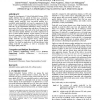Free Online Productivity Tools
i2Speak
i2Symbol
i2OCR
iTex2Img
iWeb2Print
iWeb2Shot
i2Type
iPdf2Split
iPdf2Merge
i2Bopomofo
i2Arabic
i2Style
i2Image
i2PDF
iLatex2Rtf
Sci2ools
QOSA
2015
Springer
2015
Springer
Investigating Quality Trade-offs in Open Source Critical Embedded Systems
During the development of Critical Embedded Systems (CES), quality attributes that are critical for them (e.g., correctness, security, etc.) must be guaranteed. However, this often leads to complex quality trade-offs, since non-critical qualities (e.g., reusability, understandability, etc.) may be compromised. In this study, we aim at empirically investigating the existence of quality trade-offs, on the implemented architecture, among versions of open source CESs, and compare them with those of systems from other application domains. The results of the study suggest that in CES, non-critical quality attributes are usually compromised in favor of critical quality attributes. On the contrary, we have not observed compromises of critical qualities in favor of non-critical ones in either CES or other application domains. Furthermore, quality trade-offs are more frequent among critical quality attributes, compared to trade-offs among non-critical quality attributes. Our study has implicati...
| Added | 16 Apr 2016 |
| Updated | 16 Apr 2016 |
| Type | Journal |
| Year | 2015 |
| Where | QOSA |
| Authors | Daniel Feitosa, Apostolos Ampatzoglou, Paris Avgeriou, Elisa Yumi Nakagawa |
Comments (0)

